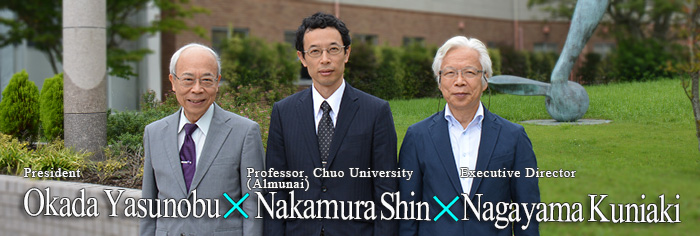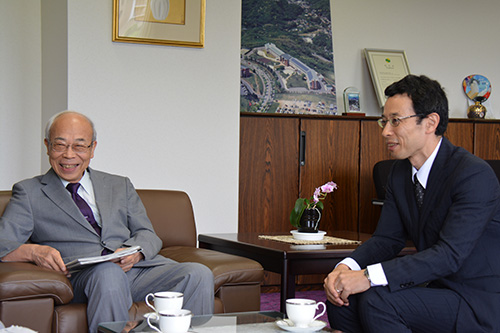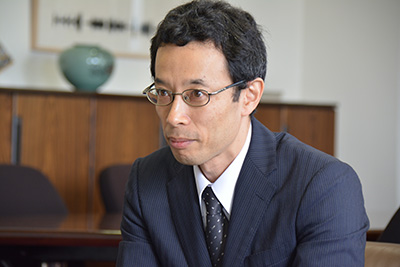[Interview] Professor, Chuo University Nakamura, Shin No. 1


Don't Get Hung Up on Common-sense Scenarios "If you knock on the stone bridge, you won't be able to cross it (Leap before you look)"*
* Words of the Captain of the First Japanese Antarctica Wintering Party, Eizaburo Nishibori
Interlocutor
- Nakamura, Shin (Almunai / Professor, Chuo University)
- Okada, Yashunobu (President)
- Nagayama, Kuniaki (Executive Director)
Nagayama: Hello, my name is Nagayama. I am the chairman of SOKENDAI, and will be the moderator today. Dr. Nakamura first entered graduate school at Kyoto University and then changed course after beginning his last year of the Ph.D. program. He reentered the Department of Accelerator Science in the School of Mathematical and Physical Science at SOKENDAI. We hope to hear from him that this was not necessarily the long way round.
SOKENDAI is an ideal environment where those wishing to start fresh with their research can exercise their full potential.
Okada: First, congratulations on receiving the First SOKENDAI Scientist Award. We are so pleased to have chosen such an excellent researcher.
Nakamura: No, I'm the one who is honored.
Okada: What was your path to SOKENDAI? Can you share any good or bad things that happened along the way?
Nakamura: My original specialty was experimental physics. I initially entered graduate school at Kyoto University, but as I studied experimental physics there, one thing led to another and I had the chance to rethink what I really wanted to do. The answer was that I was interested more in theory than experimentation. So I entered the Theoretical Research Group at the High Energy Accelerator Research Organization (KEK), moved from Kyoto to Tsukuba, and embarked upon my new research.
Okada: How did you find the research and the advisory environments at SOKENDAI?
Nakamura: It was wonderful. You could even say that it was indulgent, because KEK is one of the leading research centers for physics in Japan, and it is massive. The institution mostly focuses on experiments, but just for theory alone, there were over 10 instructors. In addition, there were post-docs from all over Japan. Graduate students from universities such as the University of Tokyo, the University of Osaka, and the University of Hokkaido were residing at the university as entrusted students, and so there were a several tens of people in the laboratory. The lab also frequently accepts researchers from abroad.
As someone who needed to absorb basic knowledge in a new field, such as the common practices and basic jargon, I was able to learn about so many different research-related topics just through listening. I thought that this was such an ideal and a blessed environment from which to start.
The importance of crossing borders! Having access to different cultures enriches perspectives, and gives birth to larger themes.
Okada: Compared to other countries, where the importance of moving around is recognized, Japan tends to lack fluidity. This is true especially in the good universities. Yet, your career has been extremely fluid.

Nakamura: That is quite true. I have been so fluid that my wife has told me to stop moving (laughter). The reason that I had to wander so much is because there aren't that many jobs in the field of Fundamental Particle Theory, so I had no choice but to move around. University positions are difficult to come by, so I had to advance my career by applying for one post-doc position after another. These positions all last about two years or so, and because there is no guarantee regarding the next job, I had to apply as soon as I found another opening.
Okada: When choosing a research theme in a situation where one's contract ends in two years, one tends to choose a something that produces short-term results. Furthermore, it would be difficult to obtain another job unless you quickly turn the results into a paper. Does this happen in your theoretical field?
Nakamura: Yes of course. However, I think we are able to work more quickly compared to those in experimental research. For example, we don't have to deal with problems such as the breakdown of experiment equipment, or a lack of funds to purchase expensive equipment. The most we use are computers, and our basic utensils are paper and pencil. If the idea is there, the math goes well, and the story holds, then we have a paper. In an extreme case, I have completed a paper in about a week. Normally, it takes a few months.
Still, although I am able to produce papers in a relatively short time, it's the same with my competitors. They also produce a lot of papers, so I can't really lay back and relax. I must hurry and produce papers faster than they do.
Okada: So there are a lot of issues. I can't really say what these are, not being in your field, but how do you encounter and engage with big themes such as Gauge/Gravity Correspondence or Superstring Theory, the themes you are working on at the moment?
Nakamura: This also owes a lot to the fact that I moved around. If you stay in the same research facility, you may continue to work on the same theme. In my case, I experienced a lot of post-doc positions within Japan, stayed in Copenhagen, Denmark for two years, and then I was offered a position in Korea. The researcher who accepted me in Korea was working on Gauge/Gravity Correspondence, and this was a big catalyst.
p.1/3
Related Content
